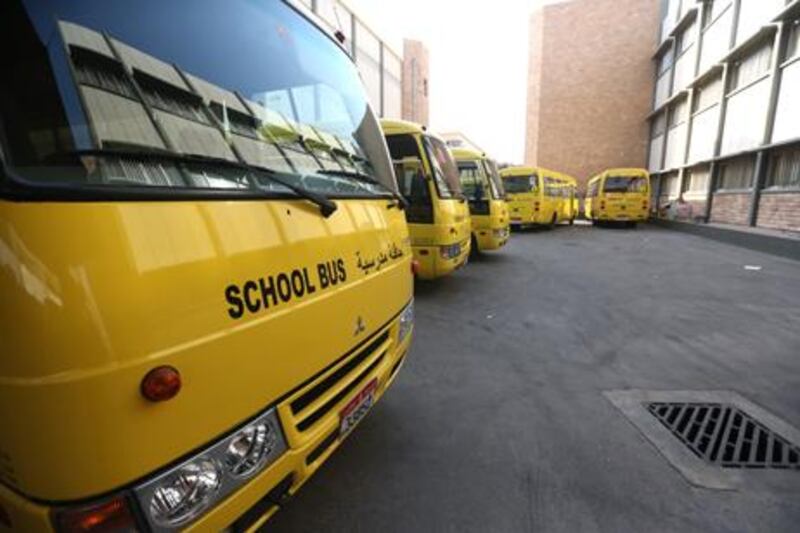ABU DHABI // A new era of improved safety and security began yesterday for thousands of children on school transport.
Hundreds of buses took to the roads for the first time with GPS tracking systems, networked CCTV cameras, automatic double flashing lights when the door is open, a driver’s side stop sign – and a brand new coat of bright yellow paint.
Abu Dhabi has more than 1,500 buses for public-school pupils and nearly 2,000 for private schools. Half the fleet has been modified to comply with new Abu Dhabi Department of Transport safety regulations, with the rest to be completed by this time next year.
Schools must operate enough air-conditioned buses for all pupils, preferably with separate vehicles for boys and girls aged 12 and older. If this is not possible, boys and girls must sit in separate areas.
A supervisor or attendant should accompany pupils aged 11 or younger to enforce the rules, and oversee boarding and dropping off at children’s homes to ensure they are met by a guardian.
Rosary School, which has 3,400 pupils, operates 22 30-seater buses with up to 21 children on each bus and one or two supervisors or attendants who ensure the children’s safety.
The school has already modified more than half its fleet. “We are now working on installing cameras to monitor the children, the driver and the bus supervisors,” said academic adviser Salwa Mahmoud.
“The cameras will be used to observe bullying among the children, and check if the supervisor is doing her job and how the driver deals with the students.”
A tracking system has been installed in all government school buses, and half of these are almost ready with CCTV networks and external cameras, said Khaled Al Ansari, the school services division manager at Adec, the Abu Dhabi Education Council.
School bus drivers must also carry out daily checks of lights, tyres, seats and the structure of the bus, and faults should be reported.
“We are in talks with Emirates Transport to ensure all necessary training has been provided to the bus supervisors,” Mr Al Ansari said.
Some examples include a practice emergency drill for children, first aid, and training drivers how to deal with children.
Mr Al Ansari said it was equally important for parents to follow the new regulations. They should designate a person to meet children aged 11 or under from the bus at the scheduled time and place.
Parents will be required to pick up children from school if they are returned there in cases where a person was unavailable to meet them at the designated bus stop, he said.
All schools must provide transport services for their pupils either through buses they operate, or via bus service contractors that abide by the safety, reliability and quality service standards and are approved and permitted by the Department of Transport.
“Not all our students take the bus since parents themselves drop and pick up their children,” Ms Mahmoud said. “We have a record of the parents’ names and vehicle licence plates.
“Our school staff and security guard also make sure that the children are safe outside the school gates at drop-off and pick-up times.”
Ayman Sughair, father of pupils aged 10 and 16, is satisfied with the school’s safety measures.
He drops and picks up his children from school, and has been accustomed to the parking nightmare near the school for years.
“We just learn to live with it,” he said. “Parents just need to co-operate with the school and not park or drive irresponsibly.”
Sheikh Khalifa bin Zayed Arab Pakistani School operates seven buses, each with 52 seats. The school is now working on installing GPS, CCTV cameras and other required safety systems.
Bus supervisors and teachers keep an eye on the children inside the bus, said Tabinda Alghizala, the school principal.
The school also has a waiting area so that pupils who walk home do not leave at the same time as those who take the bus.
"Ensuring the safety of our students is a very big responsibility," Ms Alghizala said. "We are trying our best to comply with the school bus regulations, and make sure the students do not leave our school unaccompanied."
rruiz@thenational.ae






